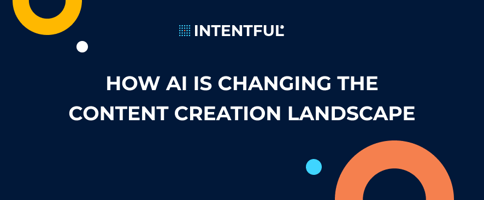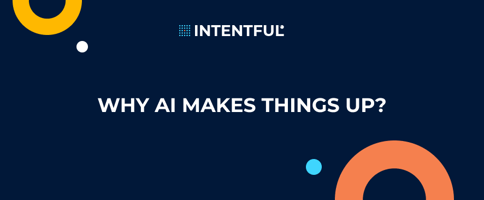Recently, especially since the launch of ChatGPT, generative AI has been making headlines and its...
AI for Enterprises
Generative AI for Enterprises
In today's rapidly evolving technological landscape, businesses are in a continuous quest to stay ahead of the curve and maintain a competitive edge. One of the most groundbreaking advancements in recent times is generative AI.
In this blog post, we will delve into the world of generative AI, exploring its capabilities, benefits, and real-life applications that can transform businesses across industries. Whether you are a seasoned enthusiast or a curious corporate leader, this article will shed light on the possibilities that generative AI can bring to the table for forward-thinking enterprises. So, fasten your seatbelts, and let’s embark on this journey into the present of artificial intelligence.
What is Generative AI?
According to World Economic Forum, “Generative AI refers to a category of artificial intelligence (AI) algorithms that generate new outputs based on the data they have been trained on. Unlike traditional AI systems that are designed to recognize patterns and make predictions, generative AI creates new content in the form of images, text, audio, and more.”
A Large Language Model (LLM), for instance, GPT-3, is one of the “computer programs for natural language processing that use deep learning and neural networks” (Wikipedia). GPT-3 was trained on 175 billion parameters. which covers various disciplines and fields, all intricately interconnected.
One crucial aspect to remember is that the "P" in “GPT” stands for "pre-trained." This means that the models do not provide real-time information, as they rely on a finite dataset.
As of now, the GPT models, including GPT-4, have been trained through September 2021. Consequently, while these models are well-versed in multiple subject matters, they are not familiar with your specific brand or current events.
It's important to note that GPT models are not (yet!) search engines, so they won't have knowledge of recent happenings. Nevertheless, they boast an impressive wealth of knowledge, making them valuable tools in various applications.
As we were working on this article, OpenAI made an announcement about the launch of Plugins for ChatGPT, making it possible for companies to “hook” into the LLM and let users browse for information about that specific company. This is a hugely important step for the development of the ChatGPT ecosystem. Get in touch to learn what you need to build a plugin and the type of content you may need.
How Does AI Know What Content to Create?
LLMs work by predicting the most suitable word based on the dataset it was trained on. Some words may have a higher probability of being chosen, while others may be less likely.
But what happens if there's no relevant data in the training dataset? In such cases, AI will continue to algorithmically predict the next best word, but because there is no correct answer, it will choose them based on statistical frequency. This results in content that may not be as accurate or reliable — it can be a hallucination, to use the accepted term, — so it's essential to be aware of these limitations when creating content with the help of AI.
Distinguishing between genuine and fabricated content remains a challenge.
To illustrate this point, we'd like to share one of our favorite examples from numerous instances we've encountered.
Back in October 2021, when AI was not as widespread and known as it is today, we worked on a project for a client. The GPT model at that time was trained through 2019, and we told AI to write about the production of A Christmas Carol that would take place in December 2021.
AI came back with this output:
A Christmas Carol 2021 at Golden Gate Theatre in San Francisco, CA, is a futuristic adaptation of this classic story. This time, the tale is told through the eyes of a cyborg named “Scrooge” and the ghost of his future self. Travel with Scrooge and experience the future of Christmas.
If one day someone stages this, this could be great — an interesting take on the classical story, but it has nothing to do with what the 2021 production in San Francisco was.
This example got into a textbook by Dr. Alex Connock — Media Management and Artificial Intelligence. If you are interested in learning about AI, it’s a great textbook that we highly recommend.
Should Enterprises Use AI for Marketing?
So do these limitations mean that you cannot use artificial intelligence in your work?
On the contrary, Intentful highly recommends that you start using AI as soon as possible.
The main reason for this is artificial intelligence is changing the way we all work, and those who don’t adopt it, will lose a competitive advantage. But how can AI be used if its training dataset is (currently) limited to September 2021?
We have an answer. AI can be trained to know your brand, and, frankly, everything you need it to know. You can train it on everything you ever wanted your content team to know, and more.
Of course, AI would never perform better than humans, but with AI, you get a tool — a super-efficient and productive assistant tool — your own platform that knows your brand and style. You can teach it to know your best-performing content — for instance, all the ads that had the best CTR or the product description with the best-converting scores on Amazon. And you can keep your model always up-to-date, training it on more and more information.
As a result, it will know things at scale that no single person can ever remember.
As technological advancements continue to progress, it is highly likely that in the near future, a majority of brands will have their own AI models specifically tailored to understand the brand’s identities, values, and goals. The models will possess deep and comprehensive knowledge about the brand and its products, services, target audience, and marketing strategies, enabling AI to support businesses in delivering a more personalized and efficient customer experience.
A trained AI model is something that you own as a company. It is not shared with other businesses. And your information is secure and is not available anywhere else.
The brand platform can have multiple use cases. You can use it for creating ads, blog posts, storyboards — any kind of content you need. Here are some AI use cases at a glance:
The Types of AI Tools
There are multiple vendors offering all sorts of AI products, but if we look at the types, these are three main ones:
-
ChatGPT is a GPT model trained to have a conversation. One of the greatest product launches of 2022, ChatGPT is one of the major technological breakthroughs. What’s important to know is that its dataset is only through September 2021. The launch of plugins will help resolve some of the data void issues. However, ChatGPT lacks knowledge about your brand outside of the data it was trained on.
-
Another option is SaaS models that have a pre-defined set of templates. These are essentially a GPT model wrapped under another brand. They are excellent for freelancers, help increase productivity and overcome writer's block. These companies played a crucial role in promoting artificial intelligence. However, because they use only the foundational GPT model, they can’t be the most effective solution for enterprises since the model doesn't know much about the brand except for what’s in the initial training dataset.
-
At Intentful, we train a GPT model to know our clients' brands. We take it one step further and connect data insights with a trained AI model to create relevant content at scale, for multiple use cases. Also, our AI solutions can be seamlessly integrated with your CMS or any other systems you're using. Essentially, we provide a custom platform that can be tailored to suit your unique business needs.
We cannot show the examples of our clients because it is confidential, but we have an example of how we trained AI for a project at the University of Oxford.
We trained AI to impersonate William Shakespeare, Oscar Wilde, Winston Churchill, and Jane Austen, for the Oxford Union debate. The motion of the debate was “This house believes most of the world’s content will soon be created by AI.”
Read how AI-imitated characters argued pro and against the motion.
Is AI Taking Away Jobs?
It is too early to say how the advancement of AI will change the job market.
We are about to witness a total transformation in the way we approach work. However, it is crucial to understand that artificial intelligence is, above all, a tool — and a powerful one.
This tool enables humans to generate high-quality content faster and more efficiently and cost-effectively than ever before. As demonstrated by numerous examples, AI can streamline tasks and produce results in under a minute. This innovative technology has the potential to reshape the future of work as we know it.
AI Use Cases for Enterprises
We'll be diving into four distinct use case categories: content (mostly text) creation, productivity enhancement, compliance, and knowledge transfer.
Content Creation
AI possibilities for text creation are virtually limitless. AI can be used to come up with various types of text, including articles, blog posts, press releases, web copy, product descriptions, and even white papers. Regardless of the type of text required, all you need to do is transform your idea into a prompt, type it, and let AI do its work.
Create content outlines or posts for social media, transform a bulleted list into paragraphs or vice versa, and so much more. Here, you can see just some of the ideas.
For instance, imagine you’ve created a new brand, “Delightful Pantry” (it does not exist and was made up by AI). Here is how a prompt could look like:
There is a new brand to be launched, “Delightful Pantry.” It offers a range of delicious and convenient food & beverage products, including snacks, ready-to-eat meals, and beverages. “Delightful Pantry” focuses on delivering great taste and variety to satisfy the diverse cravings of today’s consumers. Create an SEO-friendly copy for the brand website’s home page.
An untrained GPT4-based model returns not just SEO-friendly text, but also suggests a meta description and titles.
For a trained AI model that knows everything there is to know about “Delightful Pantry,” a short prompt would be enough: “Create an SEO-friendly copy for the brand website’s home page of ‘Delightful Pantry’.”
Tap into your creativity and brainstorm the various ways AI can enhance your text creation process. Think outside the box, consider unconventional ideas, and explore the vast array of possibilities that AI brings to the table.
Productivity
Productivity enhancement is a crucial aspect to consider. It's not just about the content you create, but also the efficiency and speed at which you can create it. By effectively training the model to possess more knowledge than your entire team combined, you can leverage artificial intelligence to expedite your processes and achieve remarkable results.
AI for Legal & Compliance
In highly regulated industries, content creation involves numerous reviews and legal approvals to ensure compliance. One innovative solution to streamline this process is to incorporate AI as an assistant in the initial review stages. Training the AI on specific guidelines and requirements, it can efficiently check texts against these standards before passing it on to the legal team.
Although the human review is still necessary from a legal perspective, AI can significantly reduce the time and effort required for this task. Instead of spending, for instance, 100 hours on text review, the expert can now dedicate only 30 hours, allowing them to accomplish more and save the company valuable resources. Leveraging AI technology in compliance and legal processes, businesses can optimize their text review procedures and improve overall efficiency.
Knowledge Transfer
Knowledge transfer is a critical yet often overlooked aspect of our rapidly evolving society. With countless events and new information emerging daily, it's nearly impossible for humans to stay current with every single change. In the realm of content creation, such as advertising and organic content, this lack of knowledge can lead to the subpar output.
This is where artificial intelligence can play a pivotal role in optimizing the content creation process and supporting us, humans. By teaching AI the essential information and updates that are important for the brand content to be effective, you can establish a standard of knowledge across the board. As a result, your team's performance and the quality of their work will be enhanced, thanks to the AI's ability to always “know” the latest developments.
What’s Next for AI for Enterprises
The adoption of AI for enterprises promises to be a game-changer in today's fast-paced, digitally-driven world. With the ability to streamline processes, enhance decision-making, and provide valuable insights, AI technologies are becoming indispensable tools for businesses across all industries.
The success of artificial intelligence implementation greatly depends on the right training of AI models that cater specifically to your enterprise's needs. This is where Intentful comes into play. With our expertise in AI model training, we can help you ensure that you harness the full potential of AI to improve efficiency, drive growth, and, ultimately, achieve your business objectives.
Take the first step towards a smarter, more efficient future for your enterprise by contacting Intentful today.


